Long rope stem cells
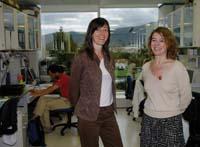
María Vivanco : I think they are a raw material to know the behavior of cells, which makes them very important. On the other hand, they are an almost inexhaustible source of conventional cells, which makes them an ideal material to test new drugs. In addition, there is the potential of regenerative medicine; it is possible that someday stem cells can replace damaged body cells, such as heart or bones...
Itziar Alkorta : I think from a social point of view they have created a great hope. This hope is only being fulfilled in part, and in some areas there is still a long way to go, so society perceives that there is still a lot of time to see facts that were promised to come true.
M. M. V. V. It is difficult to know the answer, but it seems to me that the investigators acted very responsible and made prudent statements.
It's not about blaming anyone, but, however, I think the media often help to create false expectations. It is very common to ask them, for example, how many years will we have a remedy against cancer? ", and of course, they want the answer to be a spectacular title. However, they will not normally get it, since the response of the researchers is usually: "We still do not know, we are working..."
It is difficult to maintain a balance between expectations and prudence required by every scientific process. Surely we all have the guilt that sometimes hope is disproportionate.
I. A. A. I agree. It must also be taken into account that much money has been invested in this area, both publicly and privately, and we have been promised that there will be results to justify this investment. Then, as is normal, it is only true in part.

In this sense, I think it is very important to have a formed society. Not everyone needs to be experts in molecular biology, but we live in the information society and it is essential to know how to choose, to be critical with what comes to us from the media.
M. M. V. V. We have to recognize that there are barriers or difficulties, we still have much to investigate and know.
Three are the main technical barriers to research. On the one hand, we should know much better when and how they decide to separate stem cells and how to control them. For the moment, we are able to manipulate certain types of cells, but with little efficiency. On the other hand, we must solve the problem of compatibility with the patient. Thirdly, there is a high risk of developing tumors that we should control. They are background problems and we still have to work hard to overcome them.
I. A. A. From an ethical and legal point of view, a big problem affecting stem cell research is that laws differ greatly from one country to another. The legal and ethical status of the embryo has been the central theme of debate.
In my opinion, the difference in embryo regulations is a consequence, at this time, of a debate that has overflowed. However, this debate is largely a matter of designation, which has been clearly seen with the recent approval in Spain or the next approval in Britain. The legal protection of the embryo has been adapting to the needs of the moment.
I also think there have been interests for the debate to become disproportionate. They have also used it in everyday political language, and all this is harmful to research.
Researchers need a safe legal support. It is impossible to carry out international research if in some countries it is authorized and in others it is not. And in this area, international cooperation is essential. What happens is that they have taken a boat and have come to investigate international waters. All this generates an excessive energy and economic expenditure, so it is time for this debate to recover.

M. M. V. V. I think it's a step clearly. However, as Itziar said, I think we have to do more internationally, and that, although not possible, is now very difficult.
On the other hand, I would like to point out that it gives a boost to the research that takes place in the healthcare field, which is quite new. In other countries, such as Britain and the United States, it has been done for a long time and has a great success. And here they start now. That's why I've loved seeing that from now on it's going to push.
I. A. A. I get in touch with you. This law is beneficial for research: it encourages scientific and clinical research, mandates controls in all phases... In addition, they have managed to draw a coherent map of research in biomedicine. In fact, in many communities there has been a great competition debate and, finally, this law acts quite decentrally.
To mention something that can be improved, I would say that too many issues have been regulated in the norm, such as research on human embryos, research on human beings, genetic analysis, biobanks, the commission on bioethics, the territorial structure of research, etc. I think it's too long. In other countries, a law has been drawn up for each of these issues.
Finally, I think a topic has not been given the right solution and is a very important topic, I refer to the donation of research eggs. In other countries, such as Great Britain, a great public consultation has been held to decide on their authorization, but in Spain I have not seen any effort in it. In fact, it has not been mentioned. They have always talked about embryo, but there are other aspects of greater importance, and that is one of them.
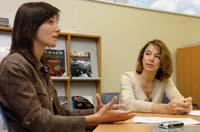
I. A. A. Spanish law has resolved the issue by sending the donation of eggs to the law of assisted fertilization. Thus, the law allows the donation of eggs for fertilisation and now also for research, and the donor receives economic compensation for its discomfort and expenses. And that is very dangerous, since, as happens in some places, women with economic need can donate eggs, not for altruistic purposes, but for money.
However, in Great Britain, a public consultation was carried out that has finally allowed the altruistic donation of eggs. In fact, the request was made by a group of scientists from Newcastle in this regard, and the HFE, regulatory authority for fertilisation and human embryos, conducted a public consultation; finally, they decided to authorize the donation of eggs, both the remainders of in vitro fertilisation and those donated for research, but always without paying. I think the new Spanish law should give a better solution.
M. M. V. V. Indeed, researchers are trying to avoid the use of female eggs by many other means. I would like to mention some works that have come out in July. They have done them with mice, but one knows if in the future they can also be made in humans.
Through the technique they have published, adult cells can become pluripotent stem cells without the need to create an embryo. For this purpose, in adult skin cells, fibroblasts, introduce four specific genes that are responsible for reprogramming the cells and turning them into pluripotent. It is true that they still have to solve some serious problems -- for example, the risk of cancer increases by 20% -- but it is a step forward and a way to avoid the use of eggs.
I. A. A. Yes, in short, the extraction of eggs in women is a risky technique and in this matter we have to look for ways that do not harm anyone and offer a guarantee and total safety.
M. M. V. V. There is still a lot of work to do and there are no definitive results. However, we can learn a lot from the research carried out with these cells, not only in regenerative medicine, but also in the experimentation of new drugs, other therapies, etc.
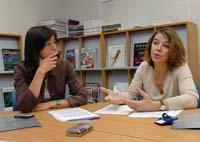
For example, in our laboratory, we work with stem cells of breast tissue. These cells show us the behavior of breast cells. In addition, a few years ago a hypothesis arose about which we are working.
The hypothesis suggests that stem cells are more resistant to the therapies used today. Therefore, in some cases of cancer, cancer seems to have disappeared after treatment, but after a while the tumor reappears. The hypothesis is that the tumors originate in stem cells, that with the treatment do not disappear and that with time they are able to recover and form a new tumor.
Therefore, these cells are an essential tool to analyze how they act and respond to different treatments, looking for treatments that achieve the definitive disappearance of cancer stem cells. Therefore, in addition to regenerative medicine, it is interesting to investigate with stem cells, although most of the titles are given to it.
I. A. A. In fact, the media have an interest in stem cell research. Another thing is that they know how to transmit that information to society, since it often happens that by a flashy title very valuable information is abandoned. That's why I really like Elhuyar.
I. A. A. The scarce tradition of informing society well and educating it in science makes society too scared and concerned in some cases. There is also a risk that some stakeholders can use the issue as a political weapon. In my opinion, it is time for recovery; otherwise, there may be a risk of overflowing and abandonment of research that may be beneficial to society, as has happened in several countries.
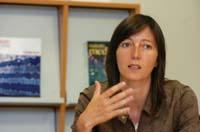
M. M. V. V. Yes, at least in my case yes, although there is always a risk that some intend to stop our work. Experiments with animals are a good example. It is undeniable in part that medicine has advanced thanks to the experiments carried out in animals. In addition, there are strict rules to ensure that these experiments are conducted in a fully controlled manner. However, there are still people who condemn the use of animals in science. To avoid them, education is essential.
I. A. A. I think it is necessary for citizens to have the capacity to understand and critically prosecute bioethical debates. Otherwise, there is a risk of manipulating these substances from different sectors. The attitude of the Catholic Church in embryonic research has been, for example, quite sectarian and interested. In view of this, it is very important that they are citizens capable of critically judging the opinions of each other.
I. A. A. In France they have the opportunity to investigate with stem cells, but until recently they have carried out very few projects. Faced with a contrary attitude in society, the scientists themselves retreated. That is why I say that in this area it is very important to have the support of society.
M. M. V. V. We wait. In this we are working to achieve the objectives. However, I would like to clarify that although investments have been made, investments must be continuous so that the investigations advance and bear fruit. It is not enough with the initial impulse, it must be maintained, and the truth is that we are still far from what they invest in science in other European countries. And it's not just public money, in other countries, private foundations, pharmaceutical companies... support research, which just happens here.
Having said this, when will the work we do here come? Objectives we are talking about; it can be long-term, in the medium term... But we are already achieving the goals. If you expect a title like "We've gotten the remedy against Parkinson's disease," we're talking about long-term goals. But stem cell research is giving results for a long time. The first stem cells were isolated from the mouse in 1981 and since then we have learned a lot.
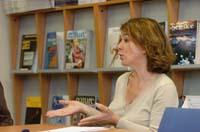
I. A. A. The difference in patents between Europe and the United States is enormous. In the United States there are numerous patents on this subject, while the European Union prohibits patenting any method involving the elimination of human embryos. However, at this level the policy of the European Patent Office has not been very coherent. I think you have to improve the laws.
I. A. A. Without a doubt. And you have to be very careful to do things right. I think we have sometimes put too much responsibility into some areas of science and have put aside others. In recent years, legislators and bioethics experts have engaged in some issues related to biomedicine, such as stem cells, and many researchers working with them complain that they are too much controlled. We must be aware that this is not the only field of science, but that the research that is carried out in other fields, such as chemistry and physics, can be more dangerous for society and is not, at all, so regulated. I think the time has come to reflect and rescue the question.
María Vivanco coincided with this reflection and both thought it appropriate to end it.
Buletina
Bidali zure helbide elektronikoa eta jaso asteroko buletina zure sarrera-ontzian








